From boom to bust in Switzerland's border towns
- Published
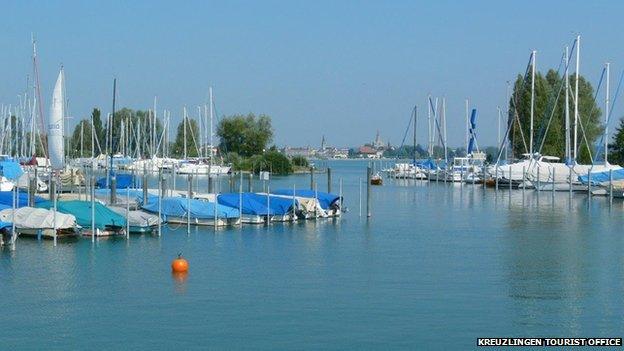
Kreuzlingen - beautiful but quiet
The Swiss border town of Kreuzlingen is a lovely, peaceful place. It lies between one of Europe's most beautiful stretches of water, Lake Constance, and the rolling hills of the canton of Thurgau, with the Alps rising majestically in the distance.
But recently, Kreuzlingen has become too peaceful, eerily quiet in fact. Its main street, optimistically redesigned and renamed the Kreuzlingen Boulevard just four years ago, is empty. There are plenty of shops, but some are closed, and those that are open have few customers.
It's a strange feeling for me to return here; I went to school just across the border in the German town of Konstanz, and almost every week my parents used to come to Kreuzlingen to shop. Petrol, beer, wine, most foods (and most importantly from my point of view, chocolate) were all cheaper on the Swiss side.
"That's right," says Silvia Cornel of Kreuzlingen's chamber of commerce. "We used to do well selling butter, pasta, petrol, but not any more."
Mighty Swiss franc
She admits that the economic downturn is a big issue for her town.
"We are talking about it almost every day. The retailers are really suffering from the current situation. Things are much more expensive, I must be honest. And yes, on our main street there are many shops [which have] closed."
The problem for Kreuzlingen's traders is the mighty Swiss franc. Throughout the eurozone crisis, it has been regarded as a safe haven, pushing its value ever higher.
For more than three years, from September 2011 to January 2015, the Swiss National Bank (SNB) pegged the currency at 1.20 Swiss francs to the euro, hoping to protect exports - and places like Kreuzlingen.
Many business leaders were disappointed, arguing that 1.30 Swiss francs to the euro was a more realistic level, but worse was to come. Last January, after spending billions buying euros, the national bank bailed out of its policy and the Swiss franc soared. For the past six months it has traded at virtually one to one with the euro.
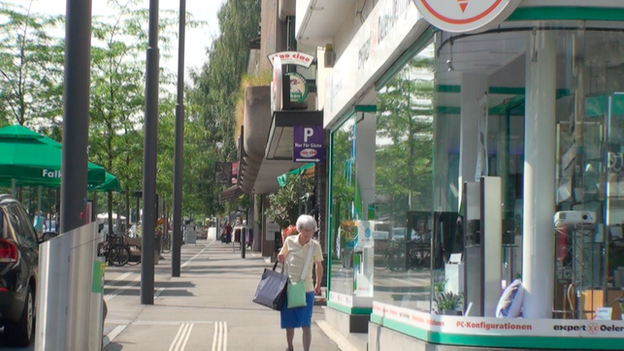
Kreuzlingen's main street is virtually empty...
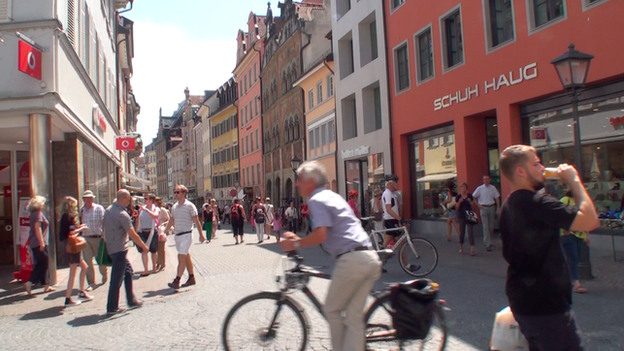
...while the German town of Konstanz bustles with shoppers
The consequences for border towns like Kreuzlingen were immediate. While Swiss prices have been somewhat higher than those in Germany for some years, with the franc now so high many products cost twice as much or more in Switzerland.
So why shop in Kreuzlingen when 10 minutes' walk away the bustling German town of Konstanz awaits?
Cars with Swiss number plates line Konstanz's streets. In the very crowded shops the voices are Swiss not German.
"Lots of Swiss are here," one woman tells me. "Everything is substantially cheaper."
"There's a huge difference," says another lady. "I bought these," she adds, holding up a pair of shoes. "And then another pair for a friend, and a dressing gown as well."
A quick price comparison says it all: Nivea shower cream, 1 euro 25 in Konstanz, 2 francs 70 in Kreuzlingen. Twice the price. A pair of Birkenstock sandals, 39 euros in Konstanz, 60 francs in Kreuzlingen. Again, significantly higher. No wonder Kreuzlingen's shops are empty.
Double whammy
But if empty shops in its border towns were the only consequence of the strong Swiss currency, Switzerland's business leaders might not be too worried.
Unfortunately the high franc has been a double blow for Switzerland: Swiss consumers are spending across the border and Swiss exports, over half of which are sold in the eurozone, are being priced out of the market.
When the euro peg was abandoned, Swiss exports became 15-20% more expensive overnight, and already the effects are being felt.
Exports overall fell 2.6 % in the first half of this year, big companies such as Roche and Swatch are reporting reduced profits, and a survey carried out this month (by Deloitte) showed that half of all Swiss companies have made or will make job cuts this year.
Others have put their workforce on shorter hours and reduced salaries or are asking staff to work longer hours for the same pay.
At the same time, Switzerland's tourism sector, an important part of the economy, is finding it increasingly difficult to compete when alpine resorts in neighbouring Austria or France have much cheaper offers.
You could argue that it's high time for high-price, high-salary Switzerland to face reality and start cutting costs, but it's not as easy as that.
Cheese woes
The cost of living for Swiss workers is higher than for their eurozone counterparts: health insurance alone leaves a big hole in everyone's salary each month. And for the majority who don't live near the border, shopping in Swiss stores is the only option. So big salary cuts would not be easy to introduce.
Switzerland's dairy farmers are a good example. For years, as agricultural subsidies slowly eroded under international trade regulations, the milk price has fallen. Now, with the sharp rise of the Swiss franc, the market for Swiss cheese is shrinking.
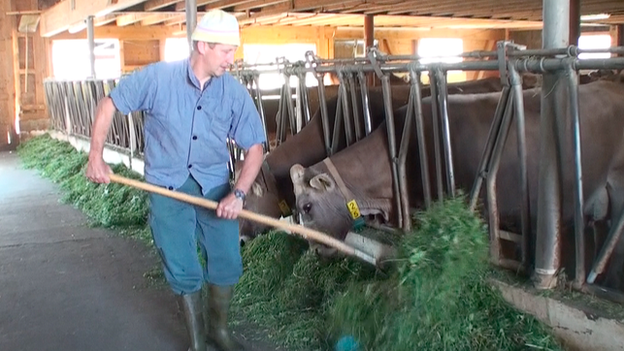
Dairy farmers like Markus Hausammann are having a hard time
"It's happening like this" explains Markus Hausammann, whose dairy farm lies just outside Kreuzlingen, "The cheese maker, who I sell my milk to, comes to me and says: 'the market is bad, I'm not selling my cheese'."
That means cheesemakers will buy less milk from the farmers, or offer an even lower price for it. And since the euro peg was abandoned, the situation has got worse.
"In May our foreign sales figures, especially for traditional cheeses, really slumped," says Mr Hausammann. "We had a 14% reduction over the same month last year."
Swiss solutions?
So what can Switzerland do? In Kreuzlingen, Silvia Cornel remains optimistic. Her own business, a small travel agency, is doing well. She offers personal attention, bespoke holidays and significantly she can sell her products in euros as well as in Swiss francs.
But she also believes Switzerland needs to capitalise on its long tradition of excellence and innovation.
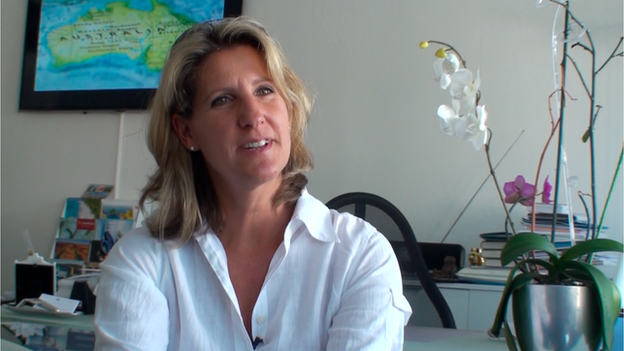
Silvia Cornel of Kreuzlingen's Chamber of Commerce wants creative thinking
"We have to come up with new solutions, new ideas, just creative thinking actually," she enthuses.
"I mean we've been through hard times in the past and we still made it. We have a high quality, we can do it, we have the knowledge, we have the innovative products here."
But Swiss cheese is the kind of high-quality, unique product that Switzerland should be able to count on even in hard times.
Swiss dairy farmers have restructured and repriced several times already to cope with the strong franc, and profits are still falling. So Markus Hausammann doesn't necessarily share Silvia's optimism. He worries for the future.
"Hard times are coming, really hard times," he predicts. "My son has just started agricultural college, and I really hope there is a future for him here on the farm. But what happens in the next 10 years in farming - well, it's written in the stars."
- Published22 January 2015

- Published20 January 2015
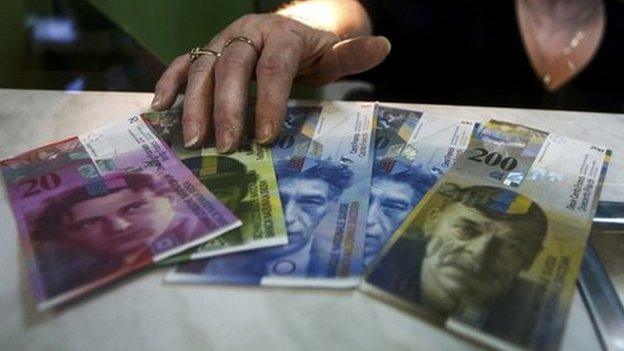
- Published15 January 2015
- Published15 January 2015
